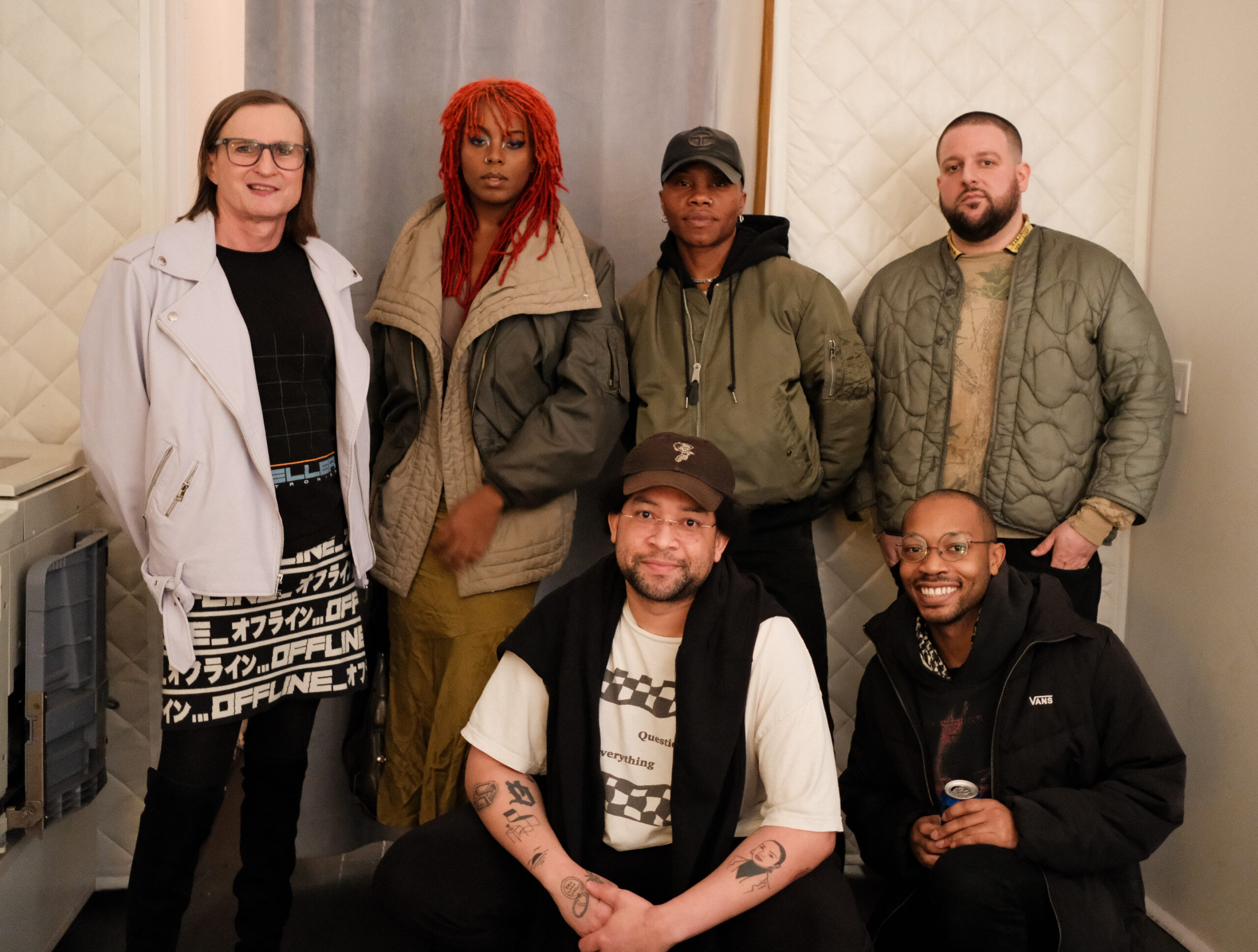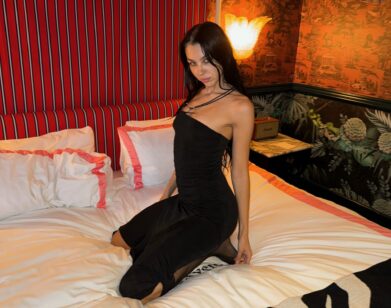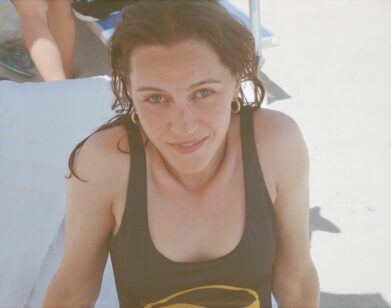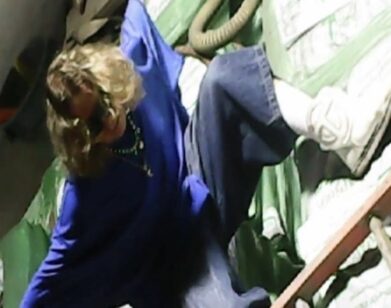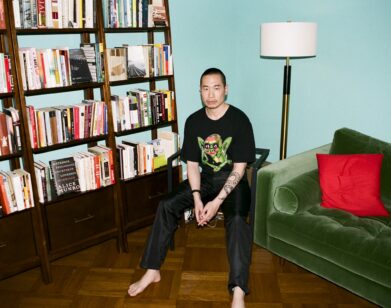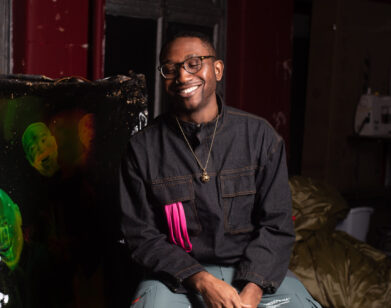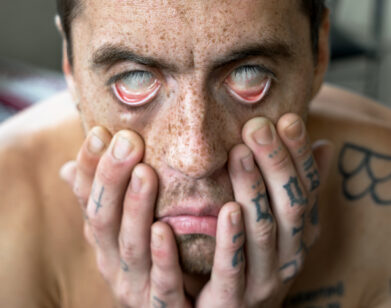panel
Dion “Tygapaw” McKenzie Wants to Decolonize the Rave
DJ and musician Dion “TYGAPAW” McKenzie’s debut solo exhibition, 3WI, currently open at upstate haven Art Omi, is a multimedia exploration of their immigration from Jamaica to the U.S. through electronic music. After a decade of carving out spaces for people of color to explore the genre, McKenzie has a club night-turned-record label aimed at “decolonizing the rave.” At “Techno is everything you haven’t imagined yet,” a panel with Montez Press Radio hosted by the show’s curator Guy Weltchek, they’re joined by fellow beloved NYC DJs Juliana Huxtable and Russell E.L. Butler, plus rave theorist McKenzie Wark, to talk liminal spaces, Bushwick DIY, and the policing of Black expression. Here, we have an abridged version of that conversation.
———
GUY WELTCHEK: Hello, everyone. Thank you so much for coming to Montez Press. All of you have spent much of your lives working in music and at clubs, and I wanted to ask you if you could just talk a bit about spaces that you’ve felt have effectively transformed you.
MCKENZIE WARK: I came back to raving at Unter when Juliana played the Discwoman Unter in 2018. That was a special show.
RUSSELL E.L. BUTLER: How far should I reach back? Fundamentally, for me, it’s basement shows in Boston, Massachusetts between 2005 and 2009. I lived in a show house called the Butcher Shop, which was a very liminal space for me. It was the first place where I could actually be a participant in so much of the youth culture around music that I’d been fetishizing from outside of America. I’m from Bermuda originally, and I grew up as a Black punk and goth with no scene to speak of. Being somewhat ostracized from the dominant Black culture in Bermuda, eventually I found bands like In Living Color or Bad Brains. That began my motivation to find other cultures to be a part of. After college, I lived in Oakland for 10 years. I was getting really into synthesizers and came across Chicago house music, particularly Future Acid tracks, Master C & J, Dubluv, and from Detroit, the Belleville Three and Drexciya. But it wasn’t until my mid-twenties that I went to my first proper club night or rave.
TYGAPAW: My earliest memories are definitely in the islands. We don’t have clubs, we just set up sound systems and speakers outside, and then a large group of people will commune. That’s how I always view club nightlife, the community aspect is a center of it for me. When I came to New York and went to Parsons, I needed to find that synergy. That’s when I discovered ballroom. I heard MikeQ play, Byrell [the Great] play, LSDXOXO play, QUEST?ONMARC. It makes sense because dancehall culture is very similar to ballroom and techno and house because we love dancing. That’s the language of how the sound is activated. A club is about seeing people move together and the music is a hypnotic force for the energy in the room.
JULIANA HUXTABLE: I think my first club was my bedroom when I was a kid. I would pretend I was Downtown Julie Brown. I had a blacklight and a disco ball, and I always had a boom box. I would dress up my brother and sister and they would pretend to be famous club goers. I have all of this on VHS from when I was a kid. Then family reunions were also club. I think churchgoing had aspects of it. It’s the combination of music and a kind of embodiment where you really just access this liminal space that feels like freedom. I went to school north of the city at Bard, where I started throwing parties, because I’ve always loved dance music. I had a music blog. I love that early-aughts era of music blogging because you could find so much dance music. I brought a lot of my favorite electronic musicians to Bard, like House of Ladosha, NGUZUNGUZU, Kingdom, people that were pushing that sound early on. Then the second I got a fake ID, I started going out in New York, and Mr. Black was a party that was happening. There was a period in New York where the most interesting dance parties were all for fashion-adjacent gay men. I’m happy to have been a part of diversifying that. It was really cool to be in those spaces, and there’s a long history, specifically in New York, of gay men pioneering dance music culture, but it was unfortunate in the sense that it wasn’t that diverse. It would be, like, Dan Deacon playing at the Williamsburg pool, which was fun but violent in a different way. It’s just cis-het white people, straight off the music blog, coked-out fascists. GHE20G0TH1K was really formative and important. It was the first party that sought a bit more of a diverse appeal and an intentional image. Then there was the crossover of Discwoman and Unter. Going to Berlin and Berghain was really informative for me, and provided what, at the time, felt like permissiveness.
GUY WELTCHEK: It’s perfect that you mentioned Berghain. Dion, you mentioned playing in Germany and people commenting on you putting snares in your tracks. I’d be curious if there are elements in your tracks that feel natural to you but are raising eyebrows in Europe.
TYGAPAW: The way I make techno is really instinctual for me. I’m not excluding any sounds from my sonic palette and I’m not disengaging with my soul and my body when I create techno. Meanwhile, in techno’s journey from Detroit to Berlin, a fragmentation happened where the Germans decided that they wanted to remove the soul. It wasn’t created in that way. When I’m researching the root of a sound I connect to, I find that Black people are often at the source. This is why I put more diasporic African aspects into my sound. My one and only set that I’ve played at Berghain was really playful and authentic.
HUXTABLE: It was excellent. I was there. Such a joy to be there.
TYGAPAW: Thank you. We have to be very brave just to defy that space, because it is incredibly intimidating, incredibly white, and it wants to shift you into one lane of sound. Josey Rebelle played before me, and she set the tone, so I just followed. It really was a complete shift of energy once Boris came on. I will quote Juliana on this one, “It’s like the gates of hell opened up.”
BUTLER: I don’t really care about that place. I’m probably never going to play there again. I’ve divested from the touring economy entirely. I’m not trying to go back to Germany. The first time that I played there in 2022, the first thought in my head was, “This is the place that kicked Theo Parrish off of the decks for playing J Dilla.” People have come up to friends of mine who played and been like, “That’s not how Panorama Bar is supposed to sound.” I am not a big fan of Reddit, but there’s an r/Berghain, and they hate Josey Rebelle. Every time she plays, they talk cash shit about her. Just terrible trolls, and this person is one of my contemporary archetypes. But they don’t take criticism, they’ll just take you off the lineup. You weren’t treated well by the staff, they just won’t invite you back. It’s not a standard-bearer for me. Everything that I care about is antithetical to that place. This is not to discount Juliana’s experience there, or my own. I’ve had great times there. But my chief criticism of Berghain is that the main floor has the best sound in the whole venue, but it is wasted on the music that’s played on those speakers.
TYGAPAW: If you play a set that defies the sound of that room, you’ll probably never get booked again. That’s how gatekeeping works in that space.
BUTLER: It shouldn’t be like that. You shouldn’t feel fear when you’re coming to share your art, and you shouldn’t feel afraid of how your friends are going to be treated there.
MCKENZIE WARK: My Berlin moment was the early ’90s in the old Tresor. It wasn’t clear what techno was going to be at that time, so it’s kind of absurd how it’s treated now. It was this very particular moment when the Wall had just come down, and no one knew what the fuck Germany was anymore. Not for the first or the last time, white culture uses Black music at times of crisis. Happy Hardcore happening in the north of England is an example of that. That, to me, is the thread that runs through all of these things that are still happening.
HUXTABLE: I don’t think there is a cohesive or clear sound. You can reduce techno to a set of tropes, but sometimes, when people say techno, they mean a community or a scene that involves clubs, promoters, attendees, record labels, clothing, aesthetics. One of the things that I find most enraging about not European and German culture is that Black artists are regularly policed for really arbitrary technical aspects. It’s absurd. I’m writing an erotic novella that is centered around a lot of my club experiences that I’ve had in Berghain. After Dion’s set, it felt like, “Crush the skulls of the enemy’s children, raging to the ethnic cleansing mix file.” I was on acid on the dance floor and I was like, “This is horrible.” But at no point did I think, “Now we’re doing conventional techno,” because the music was erratic. For Germans and other Europeans, there’s a desire to generate some benevolent cultural production that can be exported. They hold onto techno. And when Black people from the States come and tear it harder than they could ever imagine, there’s this nasty lashing out that happens. There is an insistence on erasing the sonic presence of Black people through policing of vocals and certain melodies and certain samples and this nasty cop attitude that comes out where you subject Black people to musical standards that you would never subject anyone else to. It’s ultimately about their guilt and the knowledge that their place might not be secure. Their desire to monopolize and own really expresses itself in policing the definition of techno.
WELTCHEK: That brings me to my next question. Part of the reason I was excited to do a show with Dion is that I noticed an uptick in critical writing about techno in the past few years, which I, as a longtime musician and curator, found exciting. Are there things you find exciting about the discourse or missing from the discourse?
WARK: I wanted to open a space for new language when I was doing interviews around the Raving book. Everybody’s like, “It’s about transcendence.” “It’s about utopia.” “It’s about resistance.” I’m like, “No.” I just wrote a whole fucking book with different language in it. I’m interested in opening spaces where people can come up with new language that’s contemporary. The music moves. Can the language move with it? In this economy, you have to make spaces where that can happen. That’s what I’ve tried to do with the work around the book, is pass the mic.
BUTLER: I’m not sure if people are really listening to music. Maybe they’re listening in a functional way, but are they sitting in their living room, putting this thing on, and internalizing it from the very beginning to the very end? I think the discourse around fast music is a reaction to there being a lack of space in one’s own life to really just sit and be present with music. In many of our experiences, music is a background thing, whether we’re cooking or we’re commuting. The critical space for this is very important.
HUXTABLE: Sometimes I wish that there was less of an emphasis on mapping a theoretical model of what’s happening and more extraction of history and interactions between people and information on the ground. You have the records themselves, but the social reality that’s attached to them is so often ephemeral because they are spaces that don’t lend themselves to study or observation. Often you get writing about it that’s either super theoretical and takes a bird’s-eye view of what’s going on, or it’s just treated as a sensory experience. There’s a lot of writing that’s just vibe descriptions. Which are useful and interesting, but I think I crave more tea. I think fast music debate is funny because DJs are fully doing the “Back in my day.”
TYGAPAW: The younger generation is just diving into hard and fast, sometimes the recreational drugs start to inform how the music shows up in the club, especially whatever drug is most popular at the time. I’m going to have to make this really hard and abrasive techno, just because that’s the times. It’s also easier to play at that speed because there’s no variation. It’s harder to play at the speeds that we play at because it’s all groove oriented. If you miss a beat, the audience will hear, and you’ll train wreck. We’re now in a predicament where techno is such a hyper-commercialized genre, but the next wave of Black artists have put a lot of energy into take the baton and carry it into the future. There’s such brilliant artists right now. We have to support each other to be able to push through and do some impactful work.
HUXTABLE: But even with fast music, there’s such a long history of Black people pioneering really fast dance music. It might not have been called techno. Maybe it was called raga or jungle. It could be so much richer if there was an emphasis, at least in the criticism surrounding dance music, on bringing that historical tea in. There’s such a density of tools, and eyes, and means of documenting right now, I hope that the writing can ensure that there’s not that dearth of information. With the writing out of Detroit now that’s been corrected to a certain degree, but it would be cool to live in a future where you don’t have people coming to music festivals like, “Wow, techno from New York? From a Black person?” People are deadass giving that, and somewhere in Belgium. I used to joke that they think I’m going to get up and rub a microphone and fart into it and call it performance art, and run off the stage like, “Gotcha.”
WELTCHEK: It’s that conservatism that you’ve all alluded to throughout this conversation, and the codification of techno into a global industry. As New York people, we all came up in the same era in New York, going to GHE20G0TH1K and these kinds of things. Now that Americans are a bit more tuned into electronic music, how is it playing out in New York? The establishment in New York is waking up to the fact that they can instrumentalize it in the service of development and gentrification.
HUXTABLE: It’s interesting because New York is a city that’s so difficult to establish yourself financially that even just the basic noise complaint of a club probably puts a short lifespan on it. I guess that’s the paradox of all of the gentrification waves. With art, it’s similar. It’s like, “All of the artists moved to a neighborhood.” That transitional period is really short. The window of time in which you benefit from those structures is really short. When I first moved to Bushwick, one of the things that I loved was that it was so loud. You could just be loud. I would throw loud-ass house parties with full PAs and it wasn’t considered unhinged. It wasn’t considered a threat. My neighbors were doing the same thing the night before. I loved that sound was so permitted. I don’t think you could open a fully functioning club in the part of Bushwick that I lived in now that white people live there.
WARK: The rave scene specifically in New York is heavily dependent on light industrial zoning. You see parts of the city go from that directly to apartment blocks without the in between. There’s anomalies in how cities function that’s enabled the non-club rave world to exist. I just hope it still does a little longer, because I love it.
HUXTABLE: When I was first coming up, you could get a warehouse so easily because people were living in them. There really was so much space available. At the time, I don’t remember any of us calling them raves, because raving also seemed something that was by default, heavily policed. It wasn’t announced as a rave, it was just a party, but it was in a warehouse. It had all of the markings of a rave. It was very porous, more DIY. Techno, at least as a social organism or community, was verboten and outcast. No one cool was going. No one that wanted anything besides to be ripped off and date raped was going to any of those places. It was interesting to see the transition from DIY spaces to clubs. I felt some type of way about that at first. It was nice in the sense that I can actually pay half of my rent.
BUTLER: The sound systems became a lot better.
HUXTABLE: It’s not just blown out. That was an interesting transition, because it also required a professionalization of the whole scene. But I love that younger DJs actually get paid. I remember I did a night at the Cock. I don’t need to smear the promoter, but me and Anthony Decapua would DJ from 10:00 PM to 4:00 A.M. and get paid $80. For years, I’m selling molly and weed brownies in the club and doing Dominatrix work just to be able to pay my rent, and people are building nightlife empires off of you. I guess it’s better now…
TYGAPAW: I remember those days of DIY spaces. That was a really special time. We had control of shaping the space. Then, Palisades, for example, was such an instrumental venue.
HUXTABLE: I forgot about Palisades.
TYGAPAW: Some of the greatest parties I’ve been to in New York City have been held at that space. I was there when it got raided by the police, and the fire department came in and completely shut us down. I think TT The Artist was performing. It was a really big party.
BUTLER: What year?
TYGAPAW: Before the pandemic, so maybe that was 2018. That signified the shift of closing all these DIY spaces. Silent Barn.
HUXTABLE: The Spectrum. Shout out the Spectrum. I can’t believe that no one mentioned the Spectrum.
TYGAPAW: Most legendary queer club that really nurtured all of the queer BIPOCs in the community, and they got shut down. It’s just impossible at this point without some silent partner of a white man’s money to fund your space. That’s why even with a space like H0LO, there’s somebody pumping mad money into it.
BUTLER: It’s ReSolute people now. Those guys own the spot, and they renovated it. The sound is way better.
HUXTABLE: It still feels off the cuff in there.
TYGAPAW: That’s why I call attention to it, because new owners usually change the whole name and vibe, but H0LO has such a deep history in DIY. We’ve lost most of them.
BUTLER: Gatekeeping is important sometimes. I was literally at Ghost Ship. 36 people died. I knew half of them. They were mentors of mine. They were contemporaries of mine, people who booked me. It had a reverberating effect throughout the entire scene.There are benefits to professionalization, but all these places are just alcohol salespeople. They all have a bottom line. If your priority fundamentally is to keep your lights on by further facilitating people’s consumption of substances that make them dissociate, then you’re automatically not creating safety for your patrons to some extent. We’re dealing with the fentanyl crisis in real time. I just had two friends die of that last week who were iconic people. There have been some significant laws that changed, like the Cabaret Law and this recent task force law so that clubs aren’t raided anymore, but we need more. Every single one of these spaces should be unionized or collectively owned. We need to move in a way that prioritizes collective power, because all that’s truly at risk is our lives. I’ve been there. I don’t want any of y’all to go through that. DJing is fun and I hope to continue to do it. I hope to, but fundamentally, I want to live. I want to be arthritic. I want to be taken care of by people.
HUXTABLE: Girl, you don’t want this. Trust me.
BUTLER: What I’m trying to say is that I want to see a ripe old age. I got sued twice because of Ghost Ship. I couldn’t mourn my friends for years because I had to get deposed for three hours just to prove that I wasn’t a culpable member of whatever was going on there. The only way forward is through.
TYGAPAW: Let’s see a future in New York where a club is owned by a Black queer person. That would be so fabulous. Multiple, not one.

